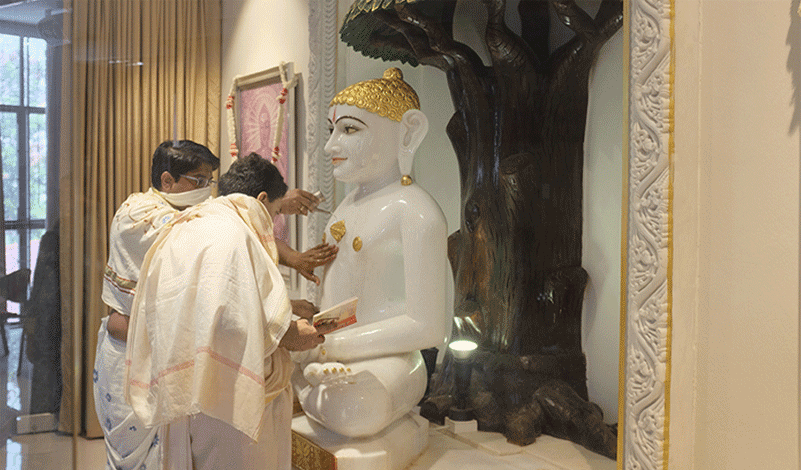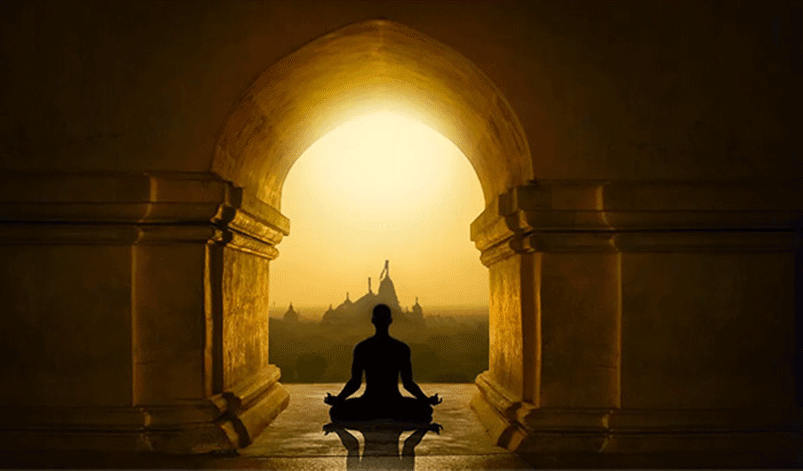Jainism says that the way to Enlightenment is through Non-Violence and doing as little harm as possible to living things, nature, and even microorganisms. As Jains believe, plants, animals, and even some things that aren't alive, like air and water, have souls just like people. Each of these souls is thought to be just as important as the others and should be treated with respect and kindness.
The Jains say that nature is complicated and that every object has 3 parts: its substance, its inherent qualities, and the infinite number of shapes it can take in time and space.
The Jain view is that the soul is a living thing that combines with different kinds of nonliving things. As the soul does things, it gathers particles of nonliving things that stick to it and decide its fate. Most of the things we can see and feel, like animals and plants, are connected in some way to living souls and are, in this way, alive. Any action has consequences that the soul must deal with, but violence against other living things is the worst way to build up the matter.
Extreme renunciation, like giving up all food, is at the heart of a discipline that rids the mind and body of all desires and actions and, in the process, burns off the effects of actions done in the past. In this way, Jain renunciants may recognise or respect deities, but they don't see the Vedas as holy books. Instead, they focus on the atheist, individual quest for purification and the removal of karma. The ultimate goal is for the individual self to "Blow Out" (Nirvana), or Die.
Jainism says that Tattva is the most basic truth that makes up reality. These are the Soul, the Non-Soul, the Inflow of Matter into the Soul, the Mixing of the Soul and Karma, the Blocking of Matter into the Soul, the Gradual Separation of Karmic Matter from the Soul, and Liberation.
The Jains don't believe in any kind of spirit. It is a religion based on the idea that people should be able to take care of themselves without help from gods. They don't have priests and don't worship specific people. Instead, they worship groups of people like "Arhats" and "Siddhas" (Perfect Ones). Gods don't play any kind of important part. People see them as living things that are neither better nor worse than other living things.

Reincarnation means that all living things go through a cycle of being Born, Dying, and being Born Again (Rebirth). Every living thing has a soul, which takes part in the cycle of rebirth. All of these souls have the same worth, so they should all be treated the same way.


To Jains, Reincarnation is determined by Karma. The idea of karma is more complicated than it seems when we use the word in normal conversation. To Jains, and people of other faiths who believe in karma, it is much more complicated than something bad happening to someone who did something bad, or vice versa.
Karma is the force that someone makes by what they do. People get karma based on how they treat other living things over the course of their lives. When someone or something dies, what happens to them or it is based on how much karma they have built up by practising ahimsa. It shows where they will go next in the cycle of rebirth or if they will leave the cycle. They can get Bad Karma if they are violent or rude to other living things, and they can get Good Karma if they practise ahimsa.
Liberation (Moksha) is thought to be when the soul reaches a completely different state, free from the effects of karma. By practising ahimsa, all living things can reach Moksha in the end. This means that the cycle of reincarnation has come to an end. Moksha is when the soul of a person who lives forever can live in happiness forever.


Jains will also do everything they can to make sure they don't hurt anyone. They won't walk through fields with insects because they don't want to step on them. Not only this, they cover their mouths so they don't swallow tiny microbes that can't be seen. Most of the time, they don't work in jobs where they could kill someone, like farming. Instead, they work in jobs like banking and business.
"Jains also make sure they never think, say, or do anything violent."